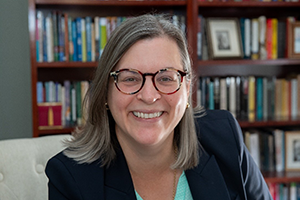Over the past two and a half years, the Reform Movement has been engaged in a process of reconciliation following revelations of abuse. It has required bravery to speak up about what happened, to face those abuses as a Movement and not downplay them, and work towards reconciliation and restoration.
I am one of the people who was harmed. I have gained strength over these years from reading this week's portion, Vayigash, as it teaches that reconciliation is always possible. After years of estrangement, Joseph reveals himself to his brothers, sobbing (Genesis 45:3). Joseph forgives his brothers for their abuse.
In my own case, I wrote an open letter about two and a half years ago to my colleagues in a private forum, explaining what happened to me. That letter and a sermon I delivered both made their way to the Board of Trustees of Hebrew Union College with my permission. As a result, I was invited to participate in the t'shuvah (repentance) process and help craft restorative rituals for addressing the harm.
When you experience abuse, there is a tendency to try to find the silver lining: "If this thing hadn't happened, I would not have had X experience or learned Y thing." Likewise, during his speech to his brothers, Joseph says, "God sent me ahead of you to ensure your survival on Earth," (Genesis 45:7). Joseph's optimism seems to be a useful choice. He has found a way to move forward in constructive ways, despite the harm that his brothers caused. In this interaction, Joseph decides that God has a plan for him, one which was enacted over the course of his life.
But there is a problem here: if we believe that God has a plan for us as Joseph does, we are still left with the canard that all bad things are a result of "God's will." If we accept that the good things that happen are God's will, do we have to accept the bad as well? Did God send me to rabbinical school so that I would have this negative experience and gain wisdom from it? That's a difficult theology to accept. I would prefer to have not had that experience, thank you. My suffering was not welcome. Would it not have been possible to have a positive experience? And does that not let my abuser off the hook?
I believe that Joseph is choosing to find the good in his situation to minimize his brothers' distress. He is aware that they blame themselves for their father's experience of loss, as they were responsible for the years that he was estranged from Joseph. They, too, are hurting. Joseph understands that their pain is a reflection of their regret. They also wish that the past looked different, and they wish that they had been able to recognize the implications of their abuse at the time they caused it.
In this situation, Joseph is showing genuine maturity. He is seeking to find the glimmer of hopefulness, the positive side of his experience, so that it might be possible to reconcile. He's letting his brothers know that all is not lost.
There's genuine growth in Joseph's magnanimity here. He's not stuck in the past nor in justifying his own narrative of pain. This reunion, though happy, is still fraught. The brothers need more time to mourn their losses and renegotiate their relationship once more when their father dies to establish for good that the past has been forgiven. Eventually, they will find their way to full forgiveness.
Reconciliation is a process: it's not achieved at once in a grand gesture, but in smaller movements. The time will come when the past is no longer the present, when we can look forward to a happier future, together. Speaking from experience, I can say that it takes a lot of courage to say to those who hurt you, "I am Joseph," to identify as the one who was harmed, but it's the first step.
Explore Jewish Life and Get Inspired
Subscribe for Emails

